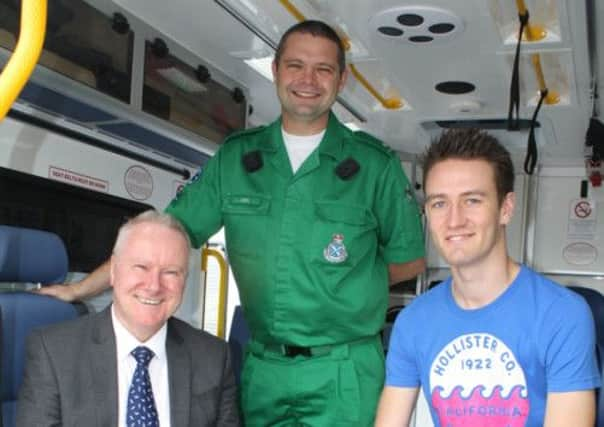New Scots teams ‘to bring patients back from dead’


A specialist team of paramedics, based in Edinburgh, has been responding to calls where a patient has suffered a cardiac arrest.
Using heart monitors, the team can respond to changes in the patient’s condition as they are treated and learn from what happens, to improve care on future call-outs.
Advertisement
Hide AdAdvertisement
Hide AdYesterday, health secretary Alex Neil met Scottish Ambulance Service (SAS) staff and patients whose lives have been saved as part of the scheme.
Officials are now looking at how the scheme could be adapted for use in other parts of the country, such as rural areas where paramedics cover large areas.
The Resuscitation Rapid Response Unit (3RU) is sent to calls where a cardiac arrest is suspected, in order to support paramedics already at the scene.
The team works with emergency medical consultants from Edinburgh University’s Resuscitation Group, based at Edinburgh Royal Infirmary, to evaluate the best approach to restarting a patient’s heart. This involves analysing data collected from defibrillators used on patients, with masterclasses from consultants so resuscitation techniques can be continually improved.
A device known as a Q-CPR is used to monitor patients during resuscitation attempts. It can alert ambulance staff immediately if they need to change their technique, such as speeding up the rate of chest compressions.
More than 500 of the devices are now being dispersed to ambulance crews and first-responder volunteers – who provide first aid while paramedics are on their way – across Scotland.
The project also involved staff wearing cameras to record what happens during resuscitation attempts so they can learn from their experiences.
This aspect of the scheme prompted some controversy when it first emerged earlier this year, but others pointed to the benefits of improved survival as a result of what paramedics were able to learn from the findings.
Advertisement
Hide AdAdvertisement
Hide AdSince the 3RU project began in April 2011, the rate of cardiac-arrest patients whose hearts have been restarted by paramedics has gradually increased, now standing at 23.5 per cent in Lothian compared to 21.4 per cent in 2011/12.
This compares to the national figure for Scotland of 17.5 per cent, up from 16.9 per cent over the same period. The target for Scotland, based on World Health Organisation standards, is between 12 and 20 per cent.
The 3RU project was developed after an earlier research project, led by Dr Richard Lyon, last year won the top prize at the European Resuscitation Council Congress.
Mr Neil said: “This ground-breaking project is a great example of our NHS and academics working together to lead the way and the results from this pilot are already demonstrating that the scheme has real potential to save many more lives.”
David Garbutt, SAS chairman, said: “This is a world-leading initiative and we are currently developing plans for appropriate models to roll out.”
‘Specialist team helped me survive’ says cardiac arrest victim
WHEN Andrew Munro’s heart stopped while playing football, he was lucky his friends had the first aid skills to start helping him immediately.
But the 19-year-old also benefitted from a special paramedic team with the skills to help restart his heart who were quickly on the scene.
Advertisement
Hide AdAdvertisement
Hide AdThe physics student, from Musselburgh, was just 16 when he fell ill while having a kick-about with his friends.
“One of my friends was trained in CPR so started doing that while another called the ambulance,” Mr Munro said. “The ambulance crew came and started doing all their stuff with the defibrillator to keep me going and managed to get me to the hospital.”
The next thing he knew, he was waking up in hospital with little memory of what had happened to him.
Mr Munro was just about to take his standard grades when he fell ill, but the trauma of this event meant he had forgotten what he needed to know to do the exams.
“I basically had to re-remember everything after what happened,” he said.
“Nobody knows what caused my cardiac arrest. They did blood tests and heart mappings to try to find out, but they never really found out so it is undiagnosed.”
Mr Munro takes drugs every day to reduce the chances of him suffering problems again.
“I think having the specialist team there, and the fact my friend cottoned on so quickly to what was happening, helped me to survive,” he said. “The ambulance was just around the corner so was there quickly.”